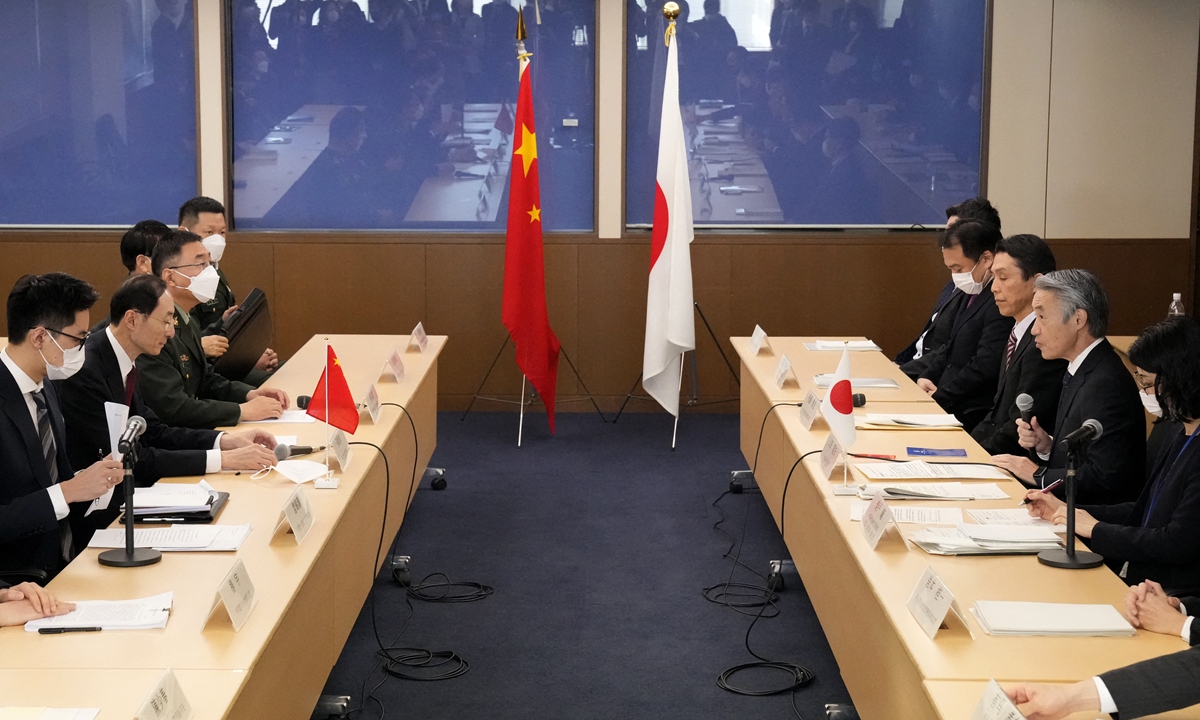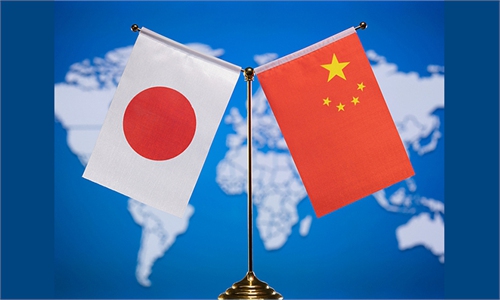
Chinese Vice Foreign Minister Sun Weidong (2nd-left) speaks with his Japanese counterpart Shigeo Yamada (2nd-right) during the China-Japan security dialogue in Tokyo on Wednesday.
After a four-year gap, China and Japan have resumed diplomatic and security talks. On Tuesday and Wednesday, the 29th regular consultation between China and Japan diplomatic authorities, the 17th China-Japan security dialogue, and the 16th China-Japan economic partnership consultation were held successively. This series of consultations show that the long-frozen bilateral contacts between China and Japan are recovering, and to a certain extent, it sends a positive signal of stabilizing China-Japan relations.
China-Japan relations are currently in an abnormally chilly state, which is in urgent need to return to the mechanism of bilateral consultation and security dialogue. The security dialogue was put on hold for four years due to the impact of the COVID-19 pandemic and the rapid deterioration of the China-Japan ties, which greatly damaged the political and security mutual trust between the two countries.
In November last year, Chinese and Japanese leaders held a meeting in Bangkok, and agreed to maintain high-level exchanges, dialogue and communication. On February 18, during his attendance at the Munich Security Conference, Wang Yi, member of the Political Bureau of the Communist Party of China (CPC) Central Committee and director of the Office of the Central Commission for Foreign Affairs, met Japanese Foreign Minister Yoshimasa Hayashi. Within a week, China and Japan held four high-level talks, which is rare in recent years. These dialogues are the implementation of the consensus reached by the leaders of the two countries. But it also reflects the many problems that have accumulated in China-Japan relations.
Japan in particular has shown a sense of tension and urgency. But it must be said that Japan has missed the point. Japan feels nervous and uncomfortable about China's rapid development, and feels an urgent need to address the situation in the Taiwan Straits that has nothing to do with it. This self-inflicted anxiety has led to a "vicious spiral" in Japan's China policy in recent years. What Japan should really be worried about is the downward trend in China-Japan relations, which is indeed dangerous. After all, there are some real contradictions between China and Japan, such as territorial disputes and well-known historical grievances. It was the four political documents between China and Japan that managed to taken them under control and helped realize a good situation of mutual benefit and cooperation between the two countries. Japan should have been the party that cherishes the four documents the most, and its offending the four documents is unreasonable.
Tokyo has shown an extremely awkward attitude toward China, which can be seen from its contact with China. According to media reports, Japan has actively sought high-level dialogues with China on several occasions, but has been unwilling to make substantive adjustments to its China policy. Instead, it has continuously strengthened its hostile attitude toward China, which has seriously deteriorated the atmosphere of bilateral relations.
What Tokyo needs is not a sense of formality, but a sincere and constructive attitude that can be felt by others. It emphasizes the importance of communication, but there is much more that Japan needs to explain and clarify to China, such as what is the purpose of Japan's purchase of 500 Tomahawk missiles? Does Japan's revision of the three security documents mean that the exclusively defense-oriented principle has been broken through? Are the four political documents between China and Japan still binding on Tokyo? And so on.
China is not as ambivalent and contradictory as Japan. Simply put, we use "two hands" to deal with Japan's "two faces." We will not hesitate to counter and strike back Japan's words and actions that harm our interests, while at the same time maintaining communication and exchange with Japan to stabilize bilateral relations. We strive for the best, but prepare for the worst.
Both China and Japan believe it is necessary to strengthen communication, and accelerate the establishment of important consensus between the leaders of the two countries -- a "constructive and stable relationship." During the meeting in Bangkok, Japanese Prime Minister Fumio Kishida stated that as close neighbors, Japan and China pose no threat to each other, and the two sides need to and should coexist in peace. He also said that Japan could hardly achieve development and prosperity without China, and the same is true the other way around. Japan welcomes China's positive contribution to the world through its own development. We look forward to seeing more of this attitude from Japan's actual actions.
This year marks the 45th anniversary of the signing of the China-Japan Treaty of Peace and Friendship. The four political documents between China and Japan are the cornerstone of bilateral relations. Whether China-Japan relations should take the right path based on this framework, or bypass it and take the evil path of confrontation with the Western political bloc, Japan is currently standing at a crossroads. This not only concerns China-Japan relationship, but also the direction of Japan's future, regional peace and stability.

